"Cherishing Little Steps - A Haven for Baby and Family Journeys"
Infant Iron-Rich Foods
Are you concerned about providing your baby with the essential nutrients they need for healthy development?
One crucial nutrient that should be on your radar is iron. Iron plays a vital role in your baby's growth and cognitive development, but how can you ensure they are getting enough?
In this discussion, we will explore a range of iron-rich foods that are suitable for infants, from purees to finger foods and cereals.
But that's not all – we will also delve into tips for enhancing iron absorption and incorporating iron-fortified formula or supplements.
Stay tuned to discover how you can support your baby's iron needs and set them up for a strong start in life.
Key Takeaways
- Iron is essential for growth and cognitive development in infants.
- Breast milk may not provide enough iron for all babies, so iron-fortified formula is recommended for formula-fed babies.
- Signs of iron deficiency in infants include fatigue, irritability, pale skin and lips, poor appetite, and slow weight gain.
- Iron-rich foods for babies include iron-rich purees like spinach and apple, lentil and carrot, and sweet potato and red pepper, as well as finger foods packed with iron like cooked and diced meats, cooked beans or lentils, and iron-fortified cereals.
The Importance of Iron for Babies

Iron is an essential nutrient for your baby's growth and development. It plays a crucial role in the production of hemoglobin, which carries oxygen to all the cells in your baby's body. Adequate iron intake is especially important during infancy, as this is a period of rapid growth and brain development.
Breast milk is a good source of iron, but it may not provide enough for all babies. If you're breastfeeding, it's important to include iron-rich foods in your own diet to ensure that your baby is getting enough iron. Some iron-rich foods for breastfeeding mothers include lean meats, poultry, fish, legumes, and fortified cereals.
On the other hand, if your baby is formula-fed, it's important to choose an iron-fortified formula. These formulas contain iron in a form that's easily absorbed by your baby's body.
It's recommended to introduce iron-rich solid foods, such as iron-fortified cereals, pureed meats, and cooked beans, when your baby is around six months old, as their iron stores start to deplete.
Signs of Iron Deficiency in Infants
If your baby is not getting enough iron, there are certain signs that you should be aware of. Iron deficiency in infants can lead to various symptoms that may indicate the need for iron-rich foods and iron deficiency prevention. To help you recognize these signs, here is a table highlighting the common symptoms of iron deficiency in infants:
| Signs of Iron Deficiency in Infants |
|---|
| Fatigue and irritability |
| Pale skin and lips |
| Poor appetite and slow weight gain |
These signs may occur when your baby's iron levels are low, and it is important to address them promptly. Iron deficiency prevention is crucial for your baby's overall health and development. By incorporating iron-rich weaning foods into your baby's diet, you can ensure an adequate intake of this essential nutrient. Some examples of iron-rich weaning foods include pureed meats, iron-fortified cereals, and legumes. Remember to consult with your pediatrician to determine the appropriate amount of iron your baby needs and to address any concerns regarding iron deficiency. By being aware of the signs and taking preventive measures, you can help support your baby's iron needs and promote their well-being.
Iron-Rich Purees for Baby's First Foods
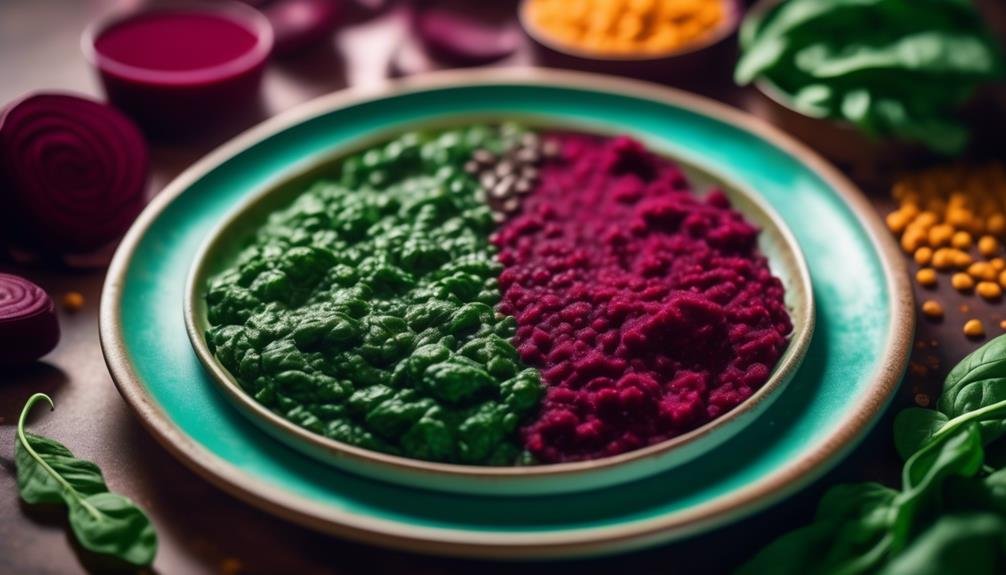
Introduce your baby to a variety of iron-rich purees as their first solid foods. These nutritious purees won't only provide your little one with essential iron but also help them develop a taste for different flavors and textures.
Here are three iron-rich purees that you can include in your baby's diet:
- Spinach and Apple Puree: Blending cooked spinach with sweet apples creates a delicious combination that's packed with iron. Spinach is a great source of non-heme iron, while apples add natural sweetness and fiber.
- Lentil and Carrot Puree: Lentils are a fantastic source of plant-based iron, and combining them with carrots adds a hint of natural sweetness. This puree isn't only rich in iron but also provides a good amount of protein and fiber.
- Sweet Potato and Red Pepper Puree: Sweet potatoes aren't only rich in iron but also packed with vitamins and antioxidants. Adding red peppers to the puree enhances the flavor and provides additional nutrients like vitamin C, which helps with iron absorption.
Introducing these iron-rich purees as your baby's first solid foods will ensure they receive the necessary nutrients for healthy growth and development. Remember to consult with your pediatrician before introducing solids and to gradually introduce new foods to monitor for any potential allergies or sensitivities.
Finger Foods Packed With Iron for Self-Feeding
As your baby continues to explore solid foods, they can now move on to finger foods that are packed with iron for self-feeding. Introducing iron-rich finger foods is an important step in meeting your baby's nutritional needs. Iron plays a crucial role in their growth and development, aiding in the formation of healthy blood cells and promoting proper brain function.
There are several iron-rich finger foods you can offer to your little one. One option is cooked and diced meats, such as chicken or beef, which provide easily absorbable heme iron. Another great choice is cooked beans or lentils, which aren't only high in iron but also a good source of protein and fiber. You can also introduce iron-fortified cereals, like iron-fortified rice or oat puffs, which are easy for your baby to pick up and enjoy.
To ensure your baby is getting enough iron, aim to offer iron-rich finger foods at least once a day. Pairing these foods with vitamin C-rich options, like citrus fruits or tomatoes, can enhance iron absorption. Remember to cut finger foods into small, bite-sized pieces to prevent choking hazards and always supervise your baby during mealtime.
Iron-Fortified Cereals for Breakfast
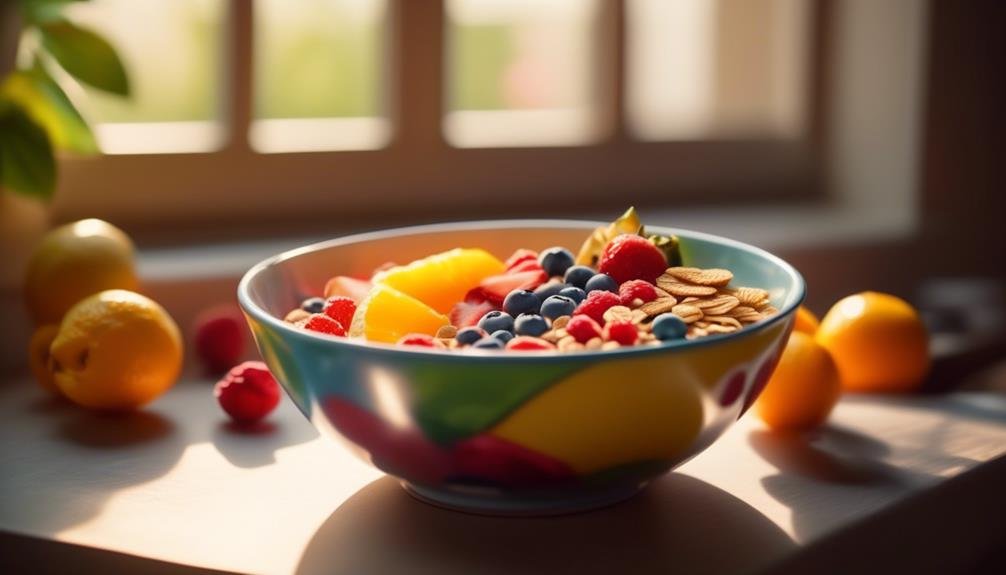
Start your baby's day with a nutritious boost by incorporating iron-fortified cereals into their breakfast routine. Iron fortified cereals are a convenient and reliable source of iron for your little one. Here are three reasons why you should consider including iron-fortified cereals in their morning meal:
- Iron-packed goodness: Iron-fortified cereals are specifically formulated to provide infants with the iron they need for healthy growth and development. These cereals are fortified with essential nutrients, including iron, to meet your baby's nutritional requirements.
- Easy to prepare: Iron-fortified cereals are incredibly easy to prepare. Simply mix the cereal with breast milk, formula, or water to create a smooth and creamy texture that's suitable for your baby's age and developmental stage. This makes them a convenient option for busy parents who want to provide a nutritious breakfast for their little one.
- Versatile and customizable: Iron-fortified cereals can be easily customized to suit your baby's taste preferences. You can add mashed fruits or vegetables, such as bananas or sweet potatoes, to enhance the flavor and provide additional nutrients. This versatility allows you to introduce new flavors and textures to your baby's diet while ensuring they receive the iron they need.
While iron-fortified cereals are a fantastic option for breakfast, it's important to remember that there are alternative breakfast options that also provide iron. These include pureed meats, mashed beans, and cooked vegetables. Consult your pediatrician to determine the best breakfast options for your baby's specific needs.
Nutritious Iron-Rich Snacks for Toddlers
To ensure your toddler receives adequate iron intake, try incorporating nutritious iron-rich snacks into their daily routine. Iron plays a crucial role in your child's development, supporting healthy brain function and immune system. Below are some creative and delicious snack ideas that are packed with iron to keep your little one healthy and happy.
| Snack Ideas | Iron Content (mg) | Serving Size (1 serving) |
|---|---|---|
| Iron-rich smoothies | 2.5-4 mg | 1 cup |
| Spinach and cheese quesadillas | 2.2 mg | 1 quesadilla |
| Roasted chickpeas | 2.4 mg | 1/4 cup |
| Peanut butter and banana sandwiches | 0.6 mg | 1 sandwich |
Iron-rich smoothies are a refreshing and nutritious option for your toddler. You can blend together ingredients like spinach, banana, almond milk, and a tablespoon of nut butter. These smoothies provide a good amount of iron and are a great way to sneak in some greens.
Spinach and cheese quesadillas are not only delicious but also high in iron. Simply sauté some spinach and cheese until melted, then place it between two tortillas and cook until crispy. This snack is a hit among toddlers and a fantastic source of iron.
Roasted chickpeas are a crunchy and iron-packed snack that your toddler will love. You can season them with various spices like garlic powder, paprika, and cumin before roasting them in the oven. They make a great on-the-go snack or a topping for salads.
Peanut butter and banana sandwiches are a classic favorite. Spread a thin layer of peanut butter on whole-grain bread, add sliced bananas, and voila! This snack not only provides some iron but also includes other essential nutrients like protein and healthy fats.
Incorporating these iron-rich snacks into your toddler's daily routine can help ensure they are getting the necessary iron for their growing bodies. Remember to consult with your pediatrician for personalized guidance on your child's iron needs.
Iron-Rich Meat and Poultry Options
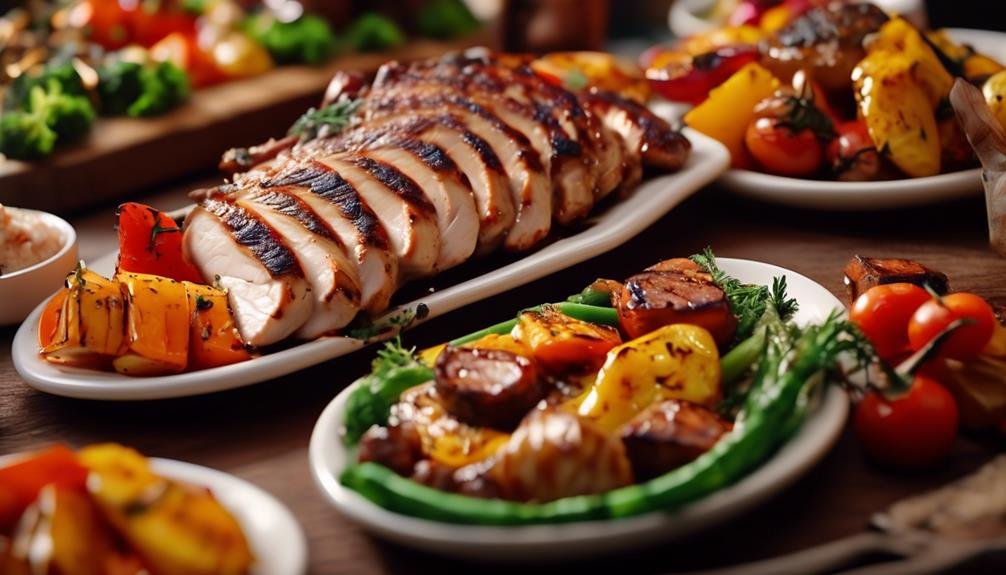
Iron-rich snacks are a great addition to your toddler's diet, but let's now shift our focus to explore the iron-rich meat and poultry options available to ensure your child gets the necessary iron intake for their growth and development.
When it comes to choosing iron-rich meat alternatives for your toddler, here are three options that aren't only packed with iron but also delicious and easy to prepare:
- Lean Beef: Beef is an excellent source of iron, providing around 2.7 mg of iron per 100 grams. Opt for lean cuts like sirloin or tenderloin to reduce the amount of saturated fat consumed. Grilling or broiling the meat preserves its iron content while keeping it flavorful.
- Chicken: Chicken is another great choice for iron-rich meat. It contains about 1.5 mg of iron per 100 grams. Roasting or baking chicken is a healthy cooking method that retains its iron content while ensuring a juicy and flavorful result.
- Turkey: Turkey is a lean protein source that also offers iron. It contains approximately 1.3 mg of iron per 100 grams. Try grilling or sautéing turkey to retain its iron content while adding a delicious smoky flavor.
Iron-Rich Fish and Seafood Choices
Delve into the world of nutrient-rich oceanic delights with these iron-packed fish and seafood choices for your toddler's diet. Including fish and seafood in your little one's meals not only adds variety to their diet but also provides them with essential nutrients like iron. Seafood is a great source of iron, which is important for the growth and development of your toddler.
Here are some iron-rich fish and seafood options that you can incorporate into your child's meals:
| Fish/Seafood | Iron Content (per 100g) |
|---|---|
| Clams | 28.8mg |
| Oysters | 10.2mg |
| Mussels | 5.8mg |
| Sardines | 2.9mg |
| Salmon | 0.6mg |
These fish and seafood choices not only provide a good amount of iron but also offer other essential nutrients like omega-3 fatty acids, which are important for brain development.
To make it easier for you to incorporate iron-rich fish and seafood into your toddler's diet, here are a few simple and delicious recipes:
- Grilled salmon with lemon and herbs
- Baked sardines with garlic and olive oil
- Steamed mussels with a tomato and garlic sauce
- Oyster stew with vegetables
- Clam chowder with whole grain crackers
Introducing fish and seafood to your toddler's diet can offer numerous benefits, including boosting their iron intake and providing essential nutrients for their growth and development. Remember to choose fresh and high-quality fish and seafood, and cook them thoroughly to ensure food safety.
Vegetarian Iron-Rich Foods for Baby
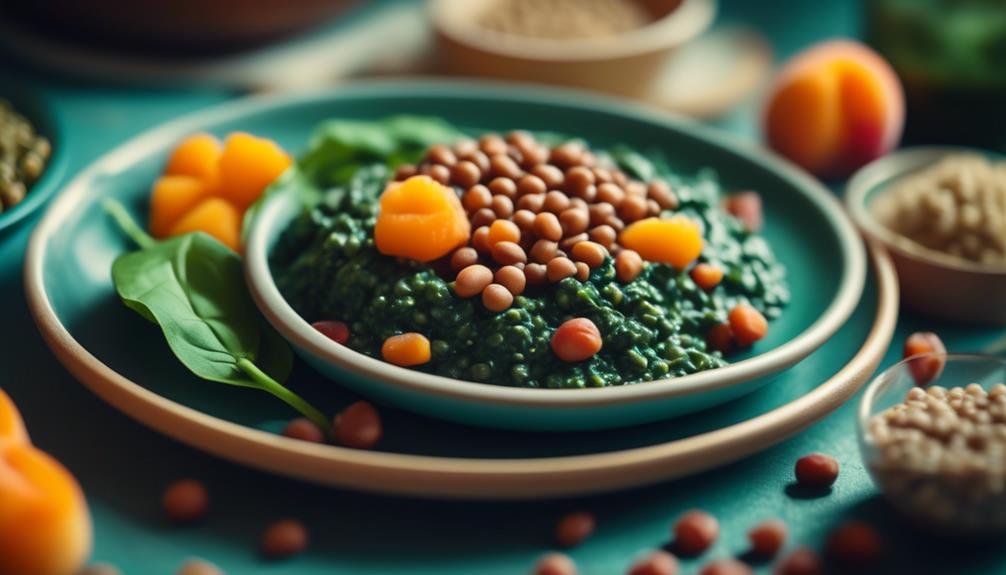
Boost your baby's iron intake with these vegetarian options that are packed with essential nutrients. Here are three iron-rich vegetarian snacks and fruits that your little one can enjoy:
- Spinach: This leafy green is a nutritional powerhouse, containing high amounts of iron. You can puree cooked spinach and offer it to your baby or add it to their meals for added iron.
- Tofu: Made from soybeans, tofu is a versatile and nutritious option for vegetarian babies. It's an excellent source of iron and can be easily incorporated into various dishes. Cube or mash tofu to make it suitable for your baby's age and offer it as a finger food or mix it into purees.
- Prunes: Rich in iron and fiber, prunes make for a delicious and nutritious snack for your baby. You can puree prunes or offer them as small pieces for self-feeding. Prunes also help regulate bowel movements, which can be beneficial for babies struggling with constipation.
These vegetarian iron-rich snacks and fruits provide your baby with the necessary nutrients to support their growth and development. Introducing a variety of iron-rich foods early on establishes healthy eating habits and ensures your baby receives adequate iron for their overall well-being.
Iron-Rich Fruits and Vegetables to Include in Baby's Diet
Including a variety of fruits and vegetables that are rich in iron is essential for your baby's diet. These iron-rich foods will help ensure that your little one receives the necessary nutrients for healthy growth and development.
Here are some iron-rich fruits and vegetables that you can incorporate into your baby's diet:
| Fruits | Vegetables | Grains |
|---|---|---|
| Apricots | Spinach | Quinoa |
| Prunes | Broccoli | Brown rice |
| Raisins | Sweet potatoes | Oats |
Apricots, prunes, and raisins are all excellent sources of iron when introduced as purees or mashed for your baby. Spinach and broccoli are high in iron and can be steamed and pureed for easy consumption. Sweet potatoes are not only a great source of iron but also provide important vitamins and minerals. Quinoa, brown rice, and oats are iron-rich grains that can be introduced to your baby's diet as they progress to solid foods.
To make mealtime more exciting, you can also create iron-rich smoothies by blending fruits like apricots, prunes, and raisins with spinach or broccoli. This will provide a delicious and nutritious way for your baby to consume iron-rich foods.
Incorporating Iron-Fortified Formula or Supplements
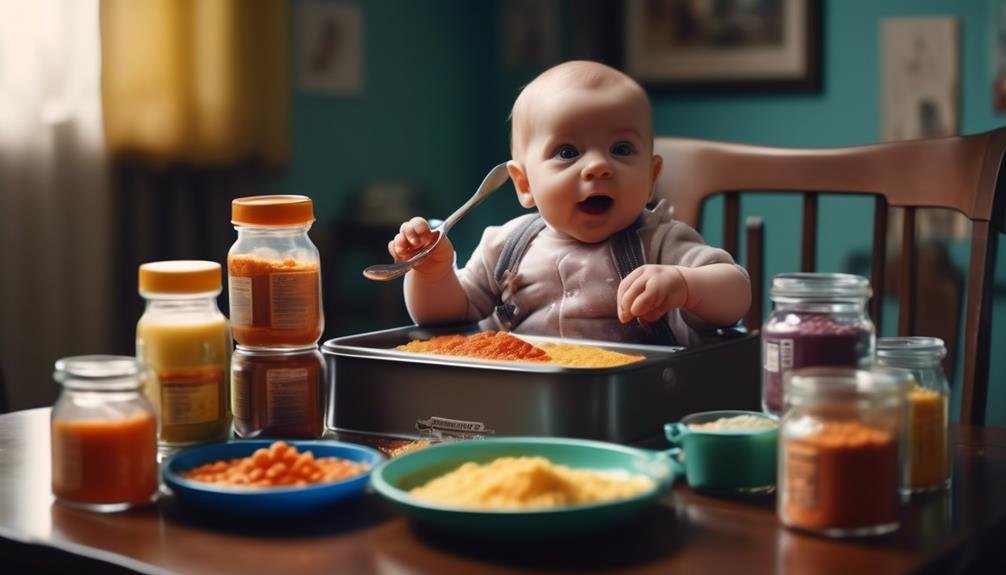
To ensure that your baby is getting enough iron, incorporating iron-fortified formula or supplements into their diet can be beneficial. Iron fortified formula has many benefits, including providing a reliable and consistent source of iron for your baby. It's specially designed to meet the nutritional needs of infants and is easily digestible.
Here are three reasons why incorporating iron-fortified formula or supplements can be advantageous for your baby:
- Ensures Adequate Iron Intake: Iron is crucial for your baby's growth and development. Iron-fortified formula or supplements can help ensure that your baby is getting the necessary amount of iron, especially if they aren't consuming enough iron-rich foods.
- Prevents Iron Deficiency: Iron deficiency can lead to anemia, which can affect your baby's cognitive and physical development. By incorporating iron-fortified formula or supplements, you can reduce the risk of iron deficiency and its associated complications.
- Convenient and Easy to Use: Iron-fortified formula or supplements are readily available and easy to incorporate into your baby's diet. They provide a convenient option for busy parents or for situations where iron-rich foods may not be readily accessible.
Tips for Enhancing Iron Absorption in Babies
Enhancing iron absorption in babies can further optimize their iron intake, complementing the benefits of incorporating iron-fortified formula or supplements into their diet. To enhance iron absorption, you can follow certain tips and strategies to ensure that your baby is getting the most out of their iron-rich meals.
One way to enhance iron absorption is by pairing iron-rich foods with vitamin C-rich foods. Vitamin C helps in the absorption of iron in the body. You can include foods such as oranges, strawberries, or tomatoes alongside iron-rich foods like spinach, lentils, or tofu.
Another tip is to avoid giving your baby calcium-rich foods or beverages with their iron-rich meals. Calcium can inhibit the absorption of iron. So, it's best to avoid giving your baby dairy products or calcium-fortified foods at the same time as iron-rich meals.
Cooking techniques can also play a role in enhancing iron absorption. Cooking in cast iron pans can increase the iron content of the food. Additionally, soaking and sprouting legumes can help reduce the phytates, which can interfere with iron absorption.
Frequently Asked Questions
Can Iron Deficiency in Infants Lead to Long-Term Health Problems?
Iron deficiency in infants can lead to long-term health problems. To prevent these consequences, it's important to ensure they consume iron-rich foods. Make sure your little one gets the nutrients they need for a healthy future.
What Are the Best Sources of Iron for Babies Who Are Just Starting Solids?
When starting solids, remember to introduce iron-rich fruits like prunes and apricots to your baby. To maximize iron absorption, pair these fruits with vitamin C-rich foods like oranges or strawberries.
How Can I Tell if My Baby Is Getting Enough Iron in Their Diet?
You can tell if your baby is getting enough iron in their diet by looking out for signs of iron deficiency in infants. Make sure to incorporate iron-rich foods for babies to ensure their proper growth and development.
Are There Any Vegetarian Options That Are High in Iron for Babies?
You can find plenty of vegetarian options that are high in iron for your baby. Incorporate iron-rich sources like beans, lentils, tofu, and fortified cereals into their diet. Try out iron-rich recipes specifically designed for vegetarian babies.
How Do I Know if My Baby Needs an Iron-Fortified Formula or Supplement?
If your baby is not getting enough iron from breastmilk or formula, they may need an iron-fortified formula or infant iron supplements. Consult with your pediatrician to determine the best course of action.
Conclusion
Incorporating iron-rich foods into your baby's diet is crucial for their growth and development. By introducing purees packed with iron, finger foods that promote self-feeding, and iron-fortified cereals, you can ensure your baby is getting the essential nutrients they need.
Including vegetarian options, such as iron-rich fruits and vegetables, can further enhance their iron intake. Don't forget to consider iron-fortified formula or supplements if needed.
Remember, a well-nourished baby is a happy and healthy one.


